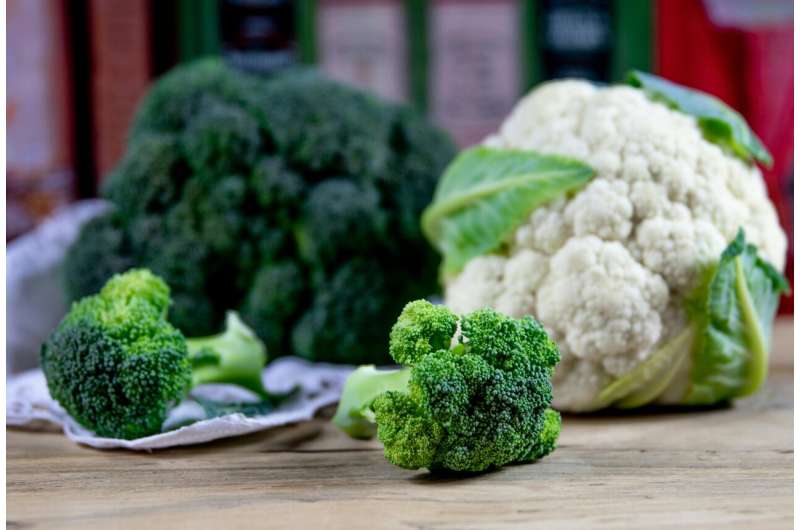This article has been reviewed according to Science X's editorial process and policies. Editors have highlighted the following attributes while ensuring the content's credibility:
fact-checked
trusted source
proofread
Eating cruciferous vegetables while breastfeeding may give infants a healthy start

Researchers from Texas A&M Health have found that breastfeeding mothers who eat vegetables such as broccoli and cabbage could pass along health benefits to their nursing infants.
The team found that a phytochemical found in cruciferous vegetables—arugula, bok choy, broccoli, Brussels sprouts, cabbage, cauliflower, collards, kale, watercress and radishes—could be transferred through breast milk.
Findings by researchers Dr. Natalie Johnson, and undergraduate students Keerthana Prayaga and Faith Haugen from Texas A&M University's School of Public Health and former graduate student Ross Shore from Texas A&M's Interdisciplinary Program in Toxicology were published in Toxicology and Applied Pharmacy.
"Phytochemicals are thought to offer protection against cardiovascular disease, cancer and loss of cognitive function, and there is even evidence that they might help us live longer," Johnson said. "More than 8 out of 10 infants born in the United States receive some breast milk, and we wanted to find out if phytochemicals or their metabolites may be transferred in breast milk to provide protection."
The current study is the first to focus on the transfer of a sulforaphane (SFN) phytonutrient metabolite—what is found in cruciferous vegetables—through breast milk. Other studies have found other phytochemicals/metabolites in breast milk, including flavonoids, carotenoids and caffeine.
In this latest study, the team assessed the transfer in two studies, one lab-based and one in the community. They measured the predominant metabolite SFN-N-acetylcysteine (SFN-NAC) in milk from breastfeeding mothers who had consumed cruciferous vegetables in the past 24 hours.
This research builds on previous work by Johnson, an inhalation and developmental toxicologist who studies the effect of chemicals and toxins on humans from the time of conception until puberty. Her research was the first to find similar results from mothers' consumption of broccoli sprouts while breastfeeding.
In addition, a study she conducted found that infants who are prenatally exposed to tiny bits of air pollution, do not mount a robust immune response and are more susceptible to respiratory viral infections.
"These new findings support the hypothesis that maternal dietary supplementation with SFN is passed on to nursing infants, although more research will be needed to determine the health benefits," Johnson said.
Johnson added that more research also is needed to evaluate how SFN-NACs affect the body as they are distributed, absorbed, metabolized and excreted, and how they in turn are affected by the body.
"Still, this is an important first step in discovering how SFN-NACs might help prevent or alleviate diseases in breastfeeding children, given that lactating women around the world consume plants and the potential benefits could be significant," she said.
More information: Ross Shore et al, Lactational transfer of sulforaphane-N-acetylcysteine in vivo and in human breast milk, Toxicology and Applied Pharmacology (2023). DOI: 10.1016/j.taap.2023.116796



















